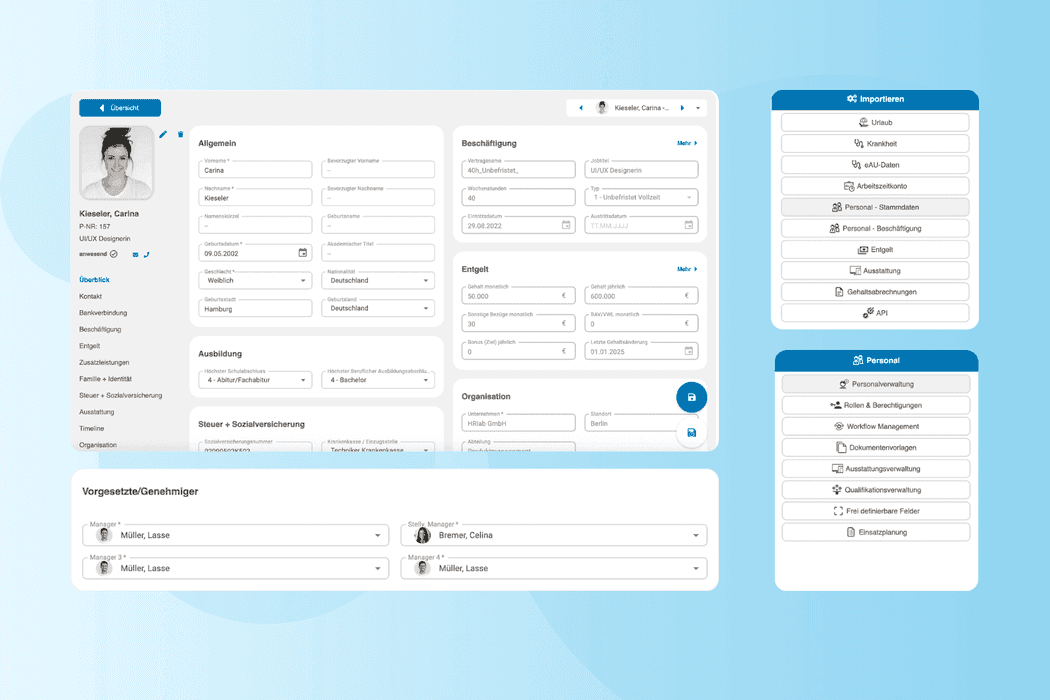Holistic View: Digital Personnel File
The personnel file should be a digital personnel file. HRlab offers security, transparency, cost and space efficiency.

All information and documents relating to the employment relationship of an employee are usually collected by the HR department in a personal file. This personnel file, which is sometimes kept for decades, is in the traditional paper form. In the meantime, however, it has been replaced by a digital personnel file. The important thing here is how to handle the data in terms of labor law and data protection.
What Belongs in a (Digital) Personnel File, What Does Not?
In principle, there are no regulations regarding the content, at most there are exclusionary ones. Documents from the following subgroups, among others, have proven to be useful:
- Settings
- Master data (name, address)
- Contact data
- Employment contract
- Remuneration
- Working hours
- Performance appraisals
- Qualifications
- Correspondence, personal changes
- Additional agreements
- Warnings
- Wage garnishments
What Data Does Not Belong in the digital personnel file?
The Following Data Is Not Stored in the Personnel File:
- All data, private matters concerning the personal rights of the employee.
- Public profiles in social media
- Records of sick days or
- Personal expert opinions obtained from unlawful access
Digital Personnel File – What Happens after Termination?
After termination of the employment relationship, the dismissed employee may not simply take “his” complete file with him or demand deletion. Retention obligations and limitation periods from tax law, social security law, labor law and the principles of proper computer-aided accounting systems (GoBS) must be considered. Anything beyond this must be destroyed for data protection reasons; DIN 66399 specifies exactly how.
What the Employer Must Hand Over from the Digital Personnel File
- Job reference
- Wage tax certificate
- Registration certificates for social insurance
- Certificates of earnings (employment agency)
- Certificate of vacation entitlement
Limitation Period
According to the German Civil Code (BGB), a former employee can still assert claims three years after the year of termination: claims for damages or issuance of a job reference, for example. The digital personnel file therefore remains stored at the company at least until this 3-year period expires.
Retention Requirements
Remuneration data must be kept for six years in case of a tax audit. To prove that all contributions and taxes have been properly paid. Receipts for total social security contributions must be kept for five years. For company pension plans, six years and at least until the employee claims the benefit.
Who Has Access to the Personnel File?
In principle, this is confidential information that requires special protection. Strict precautions must be taken to reliably prevent unauthorized access from outside. However, not just any employee may have access. Only the employer in person and individual personnel managers, even the works council alone in the “presence” of the person concerned.
The employee, in turn, has the right to unrestricted inspection, but not to be taken away. He can demand the removal of inaccurate or irrelevant data. Furthermore, he or she can comment on certain processes.
The individual data protection obligations are governed by the German Federal Data Protection Act (Bundesdatenschutzgesetz), and not only in the case of digital personnel files by the German Data Protection Regulation (DSGVO). In the case of a digital personnel file, the prior written consent of the employee is required. A common alternative is a company agreement on the electronic personnel file for all company employees.
Digital Personnel File – Advantages
- Operational simplification through automated processes
- Integration into the company’s internal IT
- Simplified regulated accessibility
- Fast evaluability is obvious
- Seamless versioning of documents Employees also benefit enormously if they can actually view their documents freely. Given data security, transparency, cost and space efficiency are also clear winners.
The advantages of digital personnel files outweigh their disadvantages many times over, such as increased data protection requirements and one-time conversion costs, including digitization work.
Disclaimer
We would like to point out that our website provides non-binding information, which under no circumstances constitutes legal advice. This also, and especially, applies to topics within the sphere of legal HR advise. The content of this contribution cannot and is not intended to replace individual and binding legal advice. For this reason, all information provided is without guarantee of correctness and completeness, but always researched with the utmost care.